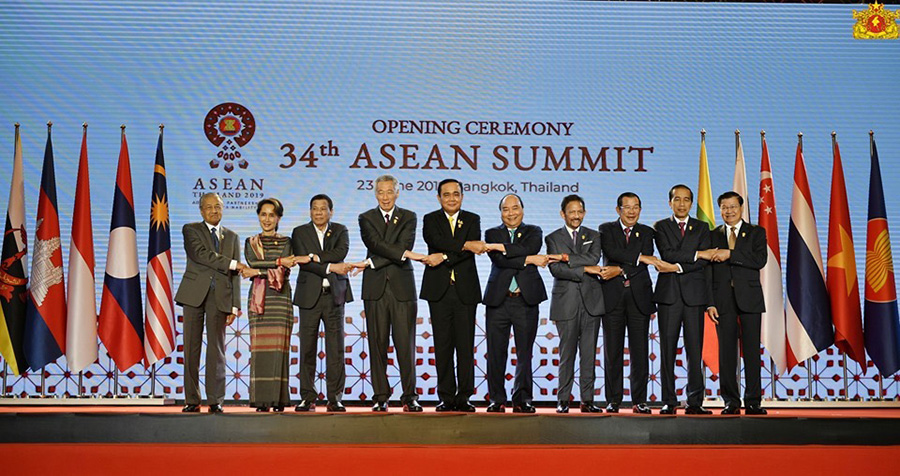YANGON—Leaders from the Association of Southeast Asian Nations (ASEAN) have reaffirmed their commitment to “a more visible and enhanced role” in supporting Myanmar in providing humanitarian assistance, facilitating the Rohingya repatriation process and promoting sustainable development in Rakhine State.
The ASEAN chairman’s statement issued on Sunday said ASEAN leaders stressed their continued support for “Myanmar’s commitment to ensure safety and security for all communities in Rakhine State as effectively as possible and facilitate the voluntary return of displaced persons in a safe, secure and dignified manner.”
On Sunday’s summit in the Thai capital of Bangkok, the Rohingya issue was one of the key issues discussed among all 10 leaders, including Myanmar State Counselor Daw Aung San Suu Kyi.
Leaders stressed the need to find a comprehensive and durable solution to address the root causes of the conflict and to create a conducive environment so that the affected communities can rebuild their lives, the statement said.
In the week before the summit, the ASEAN leaders faced pressure from human rights groups to take a stronger stance on Myanmar, including on the safe return of the Rohingya through a repatriation process and seeking to hold the military accountable for crimes against the Rohingya population in Rakhine State.
More than 700,000 Rohingya have fled Myanmar to neighboring Bangladesh since August 2017 to escape military operations that the UN has called a “textbook example of ethnic cleansing.” The Myanmar military denies these allegations, insisting the crackdown was a response to coordinated attacks on security posts in Rakhine State by the Arakan Rohingya Salvation Army.
Despite Myanmar and Bangladesh having signed a repatriation agreement in November 2017, implementation has failed repeatedly and both sides blame the other for the delay. Citing resistance to repatriation from the Rohingya who fear for their safety, rights groups have also pointed out that without legal protection such as citizenship, Rohingya refugees will continue to face persecution in Myanmar.
Last year, Myanmar signed a memorandum of understanding (MOU) with the UN’s development (UNDP) and refugee (UNHCR) agencies to help with the voluntary return and reintegration of displaced Rohingya.
Despite ASEAN having a policy of not interfering in its members’ internal affairs, the Rakhine issue has been on the agenda since 2017. The group has sent an assessment team led by ASEAN Secretary-General Lim Jock from the ASEAN Coordinating Centre for Humanitarian Assistance on Disaster Management (AHA) to coordinate with Myanmar officials on the Rakhine issue. The team visited Rakhine State in May this year and in December 2018 to conduct a preliminary needs assessment, which was based on a mandate given by ASEAN.
The team produced a report with recommendations for the leaders. The ASEAN chairman’s statement said that all the ASEAN leaders agreed to go further with the recommendations contained in the needs assessment, highlighting the need for Myanmar’s government to focus on capacity-building, dissemination of information and the support of provisions of basic services in Rakhine State, and recognized the need for adequate resources for these activities.

But Human Rights Watch criticized the report, saying it “was developed without input from Rohingya refugees and almost entirely disregards the Myanmar government’s atrocities that led to mass displacement.”
The statement said, the nation leaders urged a full implementation of the MOU between Myanmar’s government, the Office of the United Nations High Commissioner for Refugees (UNHCR) and the United Nations Development Programme (UNDP) and continued and effective dialogue between Myanmar and Bangladesh to facilitate the repatriation process of persons displaced from Rakhine State.
The leaders also encouraged Myanmar’s implementation of the remaining recommendations of the final report of the Advisory Commission on Rakhine State, led by the late United Nations secretary general Kofi Annan that was submitted to Naypyitaw in August 2017.
The group expects that the Independent Commission of Enquiry established by Myanmar “would seek accountability by carrying out an independent and impartial investigation into alleged human rights violations and related issues,” according to the statement.
The commission was formed in August 2018 to investigate allegations of human rights abuses in Rakhine after Myanmar rejected allegations in the UN fact-finding report.
Speaking to the media Don Pramudwinai, Thailand’s foreign minister, on Saturday said the ASEAN foreign ministers agreed to set out a timeframe for the repatriation of Rohingya refugees to Myanmar.
He told the media that Myanmar is considering issuing National Verification Cards to Rohingya refugees who want to voluntarily return from Bangladesh.
The chairman’s statement did not condemn the Myanmar government and followed its preference to avoid the term “Rohingya,” referring instead to “displaced persons.”
However, Malaysia took a strong stand on the Rohingya issue during the summit. Speaking on the sidelines of the Bloomberg Asean Business Summit in Bangkok on Friday, Malaysian Prime Minister Mahathir Mohamad said he vowed to help Rohingya Muslims seeking refuge in Malaysia. On Saturday, during talks with his counterparts, Malaysia’s foreign minister said the people who committed violence against the Rohingya must be brought to justice, according to the New Straits Times.
Under the theme of “Advancing Partnership for Sustainability,” the leaders discussed several broader regional issues and composed a declaration on combating marine debris in ASEAN. The leaders also adopted “ASEAN Indo-Pacific Outlook” on increased cooperation among Indo-Pacific countries. The term refers to the region between the Pacific coast of the U.S. and Japan. Japan and the U.S. are looking to boost economic and security ties with countries in the region amid China’s expanding leverage.
ASEAN is a bloc made up of Brunei, Cambodia, Indonesia, Laos, Malaysia, Myanmar, the Philippines, Thailand, Singapore and Vietnam.
You May Also Like These Stories:
State Counselor to Attend ASEAN Summit in Thailand on June 22-23
As Summit Season Begins, ASEAN Has Many Issues to Address
Southeast Asia to Launch Joint Bid to Host 2034 World Cup: Thai PM
Southeast Asian Leaders Emphasize Economic Strength in Face of US-China Tensions

















